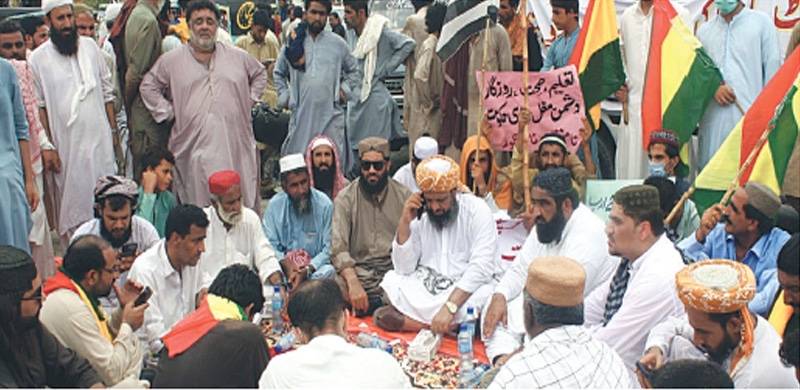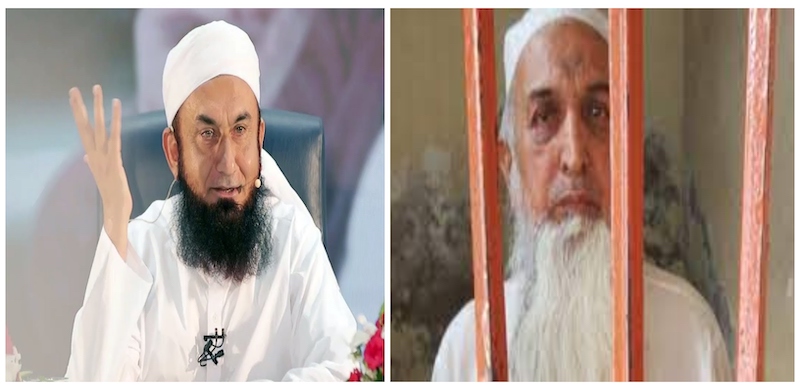
Pakistanis expressed shame and horror when the video of a septuagenarian cleric fondling a youth was released. Some alleged that it was hypocritical to tarnish clerics when university professors can be equally guilty of sexual abuse. However, even in the case of university professors, it takes years to get justice. Consider for instance, the case of the Karachi University professor, who was only recently sentenced to 8 years imprisonment for online harassment after about 5 years of 'persistence by the complainant' as Naya Daur noted. Nonetheless, the response to the Mufti is hypocritical for multiple reasons.
First, the sheer scale of horror by people with skeletons in their own closet, who transform overnight into custodians of Pakistani and Islamic morality, is more about protecting the image of clerics than any constructive reform. After all, the fact that clerics abuse youth, sexually and/or physically, is well-known. Many old grandmothers can narrate tales of the masti (mischief) of maulvis (clerics). As late as 2018, eight-year-old Mohammed Hussain was beaten to death by his madrassa teacher in Karachi. In 2004, about 500 cases of madrassa sexual abuse were reported by a Pakistani government official but people even then were more concerned about tarnishing the image of clerics than justice. So, the narrative of protecting the image of the abusers goes unchecked. People deflect to Catholic priests molesting youth or declare that the maulvi in question is not Muslim and keep venting instead of taking any constructive step towards institutional change.
Second, the culture of blaming the victim is rampant, and a younger cleric has already made the case that why did the youth, who had a beard, not resist the attempts of a septuagenarian cleric. However, such clerics do not understand the asymmetry of power and abuse of authority. If one’s livelihood, examination grades, future career, corporation promotion, academic tenure, and passport or visa renewal are at stake, then seemingly frail men can take advantage of physically fit younger men. Additionally, clerics exercise immense power, as they can control two of the most intimate parts of a human being’s life, their spirituality and sexuality. No wonder, the Qur’an cautions in verse 9:31 against taking scholars and monks as lords besides Allah.
Third, some are claiming that Allah has offered satar (veil) on personal sins and therefore such incidents should not be publicized. However, this argument is relevant in the case of consensual private conduct and not in the case of abuse of power. Hypothetically, if someone makes a video of another drinking, watching pornography or even engaging in sexual conduct in the privacy of his home, then such videos are rejected and the person who makes such videos is punished. The incident of Caliph Umar is relevant in this case where he spied on another person who was engaging in a private sin. The Caliph admonished him for his sin, but the man pushed back that while he had committed a single sin, the Caliph had committed three, by spying, not seeking permission to enter and by not entering through the front door. However, abuse of power falls outside this framework.
Fourth, it seems that clerics like Dr. Khalid Siddiqi, who was on a panel discussion with Naya Daur, are more concerned with juristic concepts of liwat (anal sex with men) rather than with abuse of power. Sabahat Ashraf with Naya Daur was right to pinpoint that Dr. Siddiqi simply focused on mechanical sexual expression than on the abuse of power. The whole panel discussion indicated how out of touch and morally irrelevant clerics like Dr. Siddiqi have become. Additionally, Dr. Siddiqi is Indian, which suggests the difficulty of getting Pakistani clerics to shed light on the issue of rampant abuse in madrassas. Indeed, the silence of the spiritual fathers of the nation like Maulana Tariq Jamil, is deafening.
To recapitulate, now that the cat is out of the bag and the matter cannot be hushed up, Mufti Aziz ur Rehman has been turned into a sacrificial ram. He has already confessed to his crime. Yet, the crime of the religious institutions and people involved, because of their complicit silence, have also been placed on the Mufti’s head. Institutional changes required to curtail future cases of sexual and physical abuse remain unaddressed and Pakistanis will continue to vent hypocritically, as such cases happen again and again.
First, the sheer scale of horror by people with skeletons in their own closet, who transform overnight into custodians of Pakistani and Islamic morality, is more about protecting the image of clerics than any constructive reform. After all, the fact that clerics abuse youth, sexually and/or physically, is well-known. Many old grandmothers can narrate tales of the masti (mischief) of maulvis (clerics). As late as 2018, eight-year-old Mohammed Hussain was beaten to death by his madrassa teacher in Karachi. In 2004, about 500 cases of madrassa sexual abuse were reported by a Pakistani government official but people even then were more concerned about tarnishing the image of clerics than justice. So, the narrative of protecting the image of the abusers goes unchecked. People deflect to Catholic priests molesting youth or declare that the maulvi in question is not Muslim and keep venting instead of taking any constructive step towards institutional change.
Second, the culture of blaming the victim is rampant, and a younger cleric has already made the case that why did the youth, who had a beard, not resist the attempts of a septuagenarian cleric. However, such clerics do not understand the asymmetry of power and abuse of authority. If one’s livelihood, examination grades, future career, corporation promotion, academic tenure, and passport or visa renewal are at stake, then seemingly frail men can take advantage of physically fit younger men. Additionally, clerics exercise immense power, as they can control two of the most intimate parts of a human being’s life, their spirituality and sexuality. No wonder, the Qur’an cautions in verse 9:31 against taking scholars and monks as lords besides Allah.
Third, some are claiming that Allah has offered satar (veil) on personal sins and therefore such incidents should not be publicized. However, this argument is relevant in the case of consensual private conduct and not in the case of abuse of power. Hypothetically, if someone makes a video of another drinking, watching pornography or even engaging in sexual conduct in the privacy of his home, then such videos are rejected and the person who makes such videos is punished. The incident of Caliph Umar is relevant in this case where he spied on another person who was engaging in a private sin. The Caliph admonished him for his sin, but the man pushed back that while he had committed a single sin, the Caliph had committed three, by spying, not seeking permission to enter and by not entering through the front door. However, abuse of power falls outside this framework.
Fourth, it seems that clerics like Dr. Khalid Siddiqi, who was on a panel discussion with Naya Daur, are more concerned with juristic concepts of liwat (anal sex with men) rather than with abuse of power. Sabahat Ashraf with Naya Daur was right to pinpoint that Dr. Siddiqi simply focused on mechanical sexual expression than on the abuse of power. The whole panel discussion indicated how out of touch and morally irrelevant clerics like Dr. Siddiqi have become. Additionally, Dr. Siddiqi is Indian, which suggests the difficulty of getting Pakistani clerics to shed light on the issue of rampant abuse in madrassas. Indeed, the silence of the spiritual fathers of the nation like Maulana Tariq Jamil, is deafening.

To recapitulate, now that the cat is out of the bag and the matter cannot be hushed up, Mufti Aziz ur Rehman has been turned into a sacrificial ram. He has already confessed to his crime. Yet, the crime of the religious institutions and people involved, because of their complicit silence, have also been placed on the Mufti’s head. Institutional changes required to curtail future cases of sexual and physical abuse remain unaddressed and Pakistanis will continue to vent hypocritically, as such cases happen again and again.
